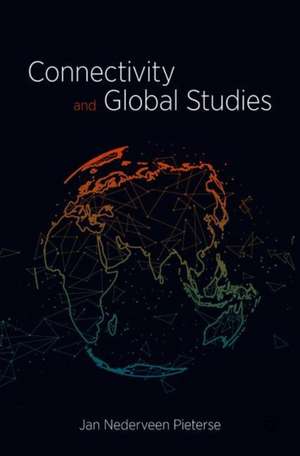Connectivity and Global Studies
Autor Jan Nederveen Pieterseen Limba Engleză Paperback – 20 feb 2021
Fluently written, clearly organized and with an interdisciplinary approach, the book will be accessible to upper division undergraduates and graduates in social sciences, including students and researchers from the fields of sociology, politics, political economy, development studies and international relations.
Preț: 468.90 lei
Preț vechi: 551.65 lei
-15% Nou
Puncte Express: 703
Preț estimativ în valută:
89.74€ • 93.44$ • 75.84£
89.74€ • 93.44$ • 75.84£
Carte tipărită la comandă
Livrare economică 10-24 martie
Preluare comenzi: 021 569.72.76
Specificații
ISBN-13: 9783030595975
ISBN-10: 3030595978
Pagini: 230
Ilustrații: XXII, 230 p. 4 illus.
Dimensiuni: 155 x 235 mm
Greutate: 0.36 kg
Ediția:1st ed. 2021
Editura: Springer International Publishing
Colecția Palgrave Macmillan
Locul publicării:Cham, Switzerland
ISBN-10: 3030595978
Pagini: 230
Ilustrații: XXII, 230 p. 4 illus.
Dimensiuni: 155 x 235 mm
Greutate: 0.36 kg
Ediția:1st ed. 2021
Editura: Springer International Publishing
Colecția Palgrave Macmillan
Locul publicării:Cham, Switzerland
Cuprins
Introduction.- 1. Global Why.- 2. Global How.- 3. Forty Four Theses on Globalization.- 4. Pattern Analysis.- 5. Histories of Globalization.- 6. Decentering Rome.- 7. DNA and Connectivity. - 8. Technology and Connectivity.- 9. Art and Connectivity.- 10. Borders and Connectivity, Enlargement-and-Containment.- 11. Paradoxes of Populism.
Notă biografică
Jan Nederveen Pieterse is Duncan Mellichamp Distinguished Professor of Global Studies and Sociology at University of California Santa Barbara, USA. He specializes in globalization, development studies and cultural anthropology.
Textul de pe ultima copertă
"This impressive book represents an enormous feat of synthesis, and offers many original insights in the fields of global studies, globalization, and connectivity. It provides lively and clearly written interpretations of complex debates, and will be extremely valuable as a teaching resource as well as making an important and lasting contribution to scholarship across many disciplines and within interdisciplinary debates." — Robert Holton, Professor Emeritus, Trinity College Dublin, Ireland
"Pieterse's new book is a tour de force. Not only does it subject existing scholarship to withering, yet reasoned critique but it also presents connectivity as the central thread of globalization. The book explores intricacies of connectivity through genetic codes, technology, art, borders, populism and much more. This is a major contribution to understanding globalization." - Barrie Axford, Professor Emeritus Oxford Brookes University, UK
This textbook provides readers with evocative and analytical accounts of social processes that are linked to globalization and connectivity, which includes a wide range of multi-centred connections in history, DNA analysis, technology, art, populism and political economy.
Rather than globalization, Nederveen Pieterse focuses on connectivity. His approach to globalization differs from both structuralist accounts of the world-system, and the institutionally-centred focus of much work in international studies. This synthesis will provide a new resource to reconstruct theoretical approaches to globalization and global studies.
Fluently written, clearly organized and with an interdisciplinary approach, the book will be accessible to upper division undergraduates and graduates in social sciences, including students and researchers from the fields of sociology, politics, political economy, development studies and international relations.
"Pieterse's new book is a tour de force. Not only does it subject existing scholarship to withering, yet reasoned critique but it also presents connectivity as the central thread of globalization. The book explores intricacies of connectivity through genetic codes, technology, art, borders, populism and much more. This is a major contribution to understanding globalization." - Barrie Axford, Professor Emeritus Oxford Brookes University, UK
This textbook provides readers with evocative and analytical accounts of social processes that are linked to globalization and connectivity, which includes a wide range of multi-centred connections in history, DNA analysis, technology, art, populism and political economy.
Rather than globalization, Nederveen Pieterse focuses on connectivity. His approach to globalization differs from both structuralist accounts of the world-system, and the institutionally-centred focus of much work in international studies. This synthesis will provide a new resource to reconstruct theoretical approaches to globalization and global studies.
Fluently written, clearly organized and with an interdisciplinary approach, the book will be accessible to upper division undergraduates and graduates in social sciences, including students and researchers from the fields of sociology, politics, political economy, development studies and international relations.
Caracteristici
Views connectivity as the central meridian of globalization Examines contemporary questions such as global trade, the rise of populism, Brexit, regional conflicts and emerging economies within the context of of long term, historical patterns and perspectives Clarifies the concepts of connectivity and ‘entanglement’ that have traditionally been difficult to follow in the study of globalization.
